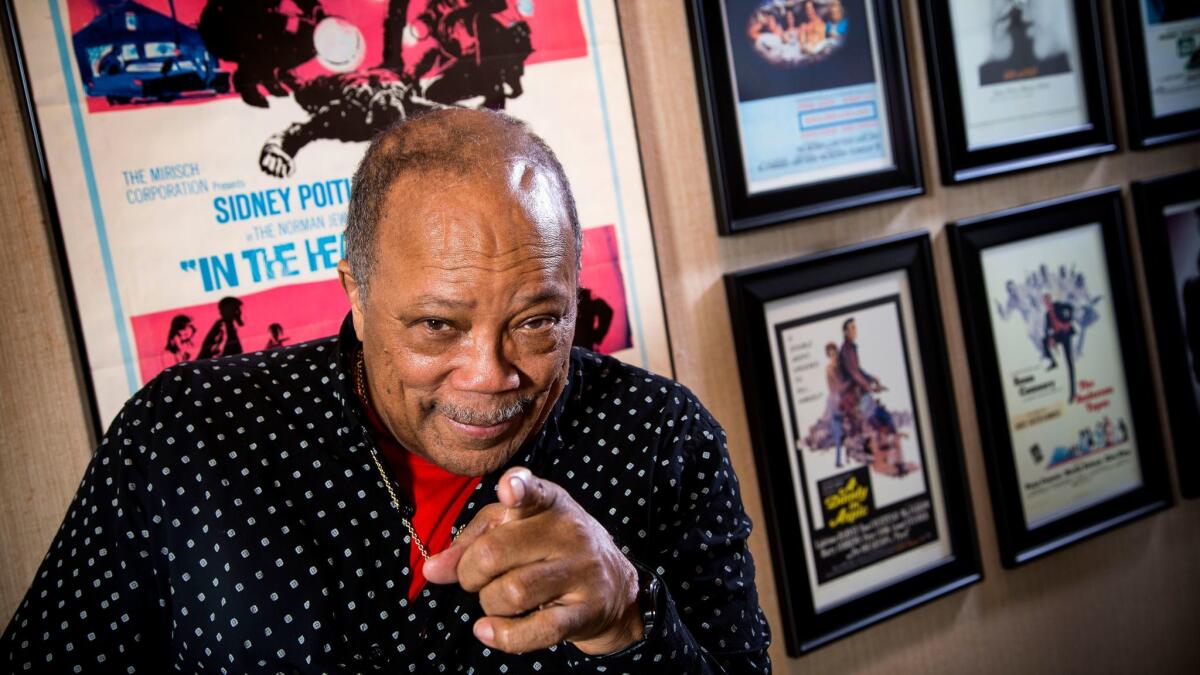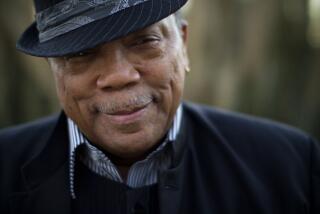Quincy Jones reflects on his career and relationship with Michael Jackson

Quincy Jones turned 84 in March, but said he feels like he’s 18.
“I stopped drinking two years ago. I feel like I’m just starting, man — it’s unbelievable. I come up with Ray Charles and Sinatra, so you know I knew how to do it,” he said, laughing, in a recent phone interview.
On Wednesday Jones’ early jazz albums will be celebrated at the Hollywood Bowl. “Quincy Jones: The A&M Years” will find an all-star lineup jamming through songs from “Walking in Space” (1969), “Gula Matari” (1970) and “Smackwater Jack” (1971).
Original session musicians Hubert Laws and Valerie Simpson will be joined by Dave Grusin, Lee Ritenour, Lewis Nash and others under the direction of Christian McBride and conductor John Clayton.
Part faithful homage, part improvised reinterpretation, the show was originally conceived by Tim Jackson, artistic director of the Monterey Jazz Festival where it premiered last September.
The albums were a concentrated burst of creativity for Jones, then newly signed to A&M Records, who had just spent the previous decade scoring around 20 films including “In the Heat of the Night” and “In Cold Blood.”
“It was some amazing years, because I said, ‘Man, I don’t want to know about synchronization for a year. I just want to get in there and roll with my favorite musicians,’” Jones said. “I just want to play with my brothers.”
The winner of 27 Grammys from a whopping 79 nominations, Jones has crafted his legend as much from assembling the best musicians in the same room as he has being a performer and arranger. The A&M albums feature some of his best-known compositions (themes for the TV series “Ironside” and “The Bill Cosby Show”) and arrangements (“Bridge Over Troubled Water,” “Killer Joe”), but they also demonstrate his knack for playing host to premium musical dinner parties.
“Ray Brown and Grady Tate had never played together until Quincy Jones brought them together for that recording,” said composer/conductor Clayton. “But also, combining people like Freddie Hubbard with Roland Kirk and Hubert Laws — those combinations didn’t happen very often, if at all. You [can] understand the flavor of why musicians are so excited about those records.”
The eclectic lineup also included Toots Thielemans on harmonica — “Toots was the same level as Charlie Parker, man,” Jones said — and Paul Beaver on synthesizer. Jones was an early adopter of synths, and wrote his “Ironside” theme (which appeared on “Smackwater Jack”) for the nascent Moog.
“Robert Moog said to me, ‘Quincy, why don’t the brothers use my instrument?’” he recalled. “I said, “’Cause, man, number one: we sculpt an electronic signal into a sine wave that’s smooth, or a sawtooth, which is rough. The problem with it, though, is it doesn’t bend. And if it doesn’t bend, it can’t get funky. And if it can’t get funky, brother, you don’t touch it.’ So he came up with a pitch-bender and a portamento on it ... and I got it, real quick.”
Jones is a musical Zelig, starting out in the big band era before time-traveling through bebop, jazz, funk, hip-hop and rap. That means, with some exceptions, he doesn’t have an instantly identifiable “sound” — but according to Clayton, that’s also his strength.
“I always think [of Jones as an] artistic sponge who delivers,” said Clayton. “Not only does he soak in anything of interest — whether it’s jazz, blues, latin music, pop music, funk ... you name it — if he’s interested, he’s going to put his hand in it and learn it.”
Jones met his most successful protege around the time he recorded these albums, a 12-year-old Michael Jackson. A few years later, he produced Jackson’s first solo album, “Off the Wall,” and then the highest-selling album of all time: “Thriller.” They fell out after releasing “Bad” in 1989 because — Jones lamented — Jackson felt the producer was old and out-of-touch.
In July, Jones won a lawsuit against Jackson’s estate for $9.4 million in damages for unpaid royalties, largely from the concert film “This Is It,” which was released in 2009 after Jackson died. In a statement, Jones said the suit “was never about Michael,” and in the interview for this article he reiterated that and further clarified that it wasn’t about the family either.
“The family wants to do business with me,” he said. “Jermaine [Jackson, Michael’s brother] called me right after we announced the lawsuit and said, ‘The family is 100% behind you.’”
Jones placed the blame squarely on the lawyers for Jackson’s estate.
“After Michael died, Frank [DiLeo, Jackson’s late manager] took over totally, and on ‘This Is It’ he did not even give me credit for producing Michael’s songs on that, man. I produced Michael’s biggest hits ... and they made $500 million on ‘This Is It.’ The family got $90 million. He got $50 million and tried to talk me into $450,000. I said, ‘No, baby, you got that wrong.’ ... Because we work our [butts] off to make records, man.”
Howard Weitzman, who represents the estate of Michael Jackson and who has been quoted as saying he plans to appeal the $9.4-million decision, sent a strongly worded rebuttal to Jones’ comments.
“Mr. Jones wasn’t cheated out of any money because he was paid what he was contractually owed for producing the songs recorded by Michael 25 to 30 years ago that were used in the documentary ‘This Is It,’ which he had nothing to do with,” Weitzman wrote.
“The allegation that Frank DiLeo got $50 million dollars in royalties from ‘This Is It’ is … false. He was not paid any royalties from the film — period. As for the beneficiaries of Michael’s will, they were not supportive of Mr. Jones’ lawsuit against the Estate.”
Jones said he and Jackson were in a good place before the singer died at age 50.
“He wanted us to get back together,” said Jones. “But we were close, man. Always close. You can’t do those kind of records without love, trust and respect. You can’t do it.”
Jones will attend Wednesday night’s concert — and even though his name isn’t on the lineup, Clayton said “Q” may even jump in.
“He probably will want to be on the sidelines, or even sitting on the stage, just because he loves to be so close to the actual music-making,” said Clayton, whom Jones affectionately calls “Dirty Drawers” in the old bebop tradition. “But I also know that the band is going to be so smoking that he’ll probably want to have a taste of it. He’ll probably want to come up and conduct one of his pieces — which would be great.”
The opening act will be two artists Jones has recently taken under his wing: Cameroon bassist Richard Bona and Swedish keyboardist Jonah Nilsson (of Dirty Loops). In addition to fostering new musical talents, the producer said he has 10 films, six albums and four Broadway shows in the works.
Asked whether he still gets the same rush from new music, his answer was immediate.
“Hell yeah,” Jones said. “More.”
♦ ♦ ♦ ♦ ♦ ♦ ♦ ♦ ♦ ♦
Quincy Jones: The A&M Years
Where: The Hollywood Bowl, 2301 Highland Ave.
When: 8 p.m. Wednesday
Tickets: $1-$120
Info: www.hollywoodbowl.com
More to Read
The biggest entertainment stories
Get our big stories about Hollywood, film, television, music, arts, culture and more right in your inbox as soon as they publish.
You may occasionally receive promotional content from the Los Angeles Times.










